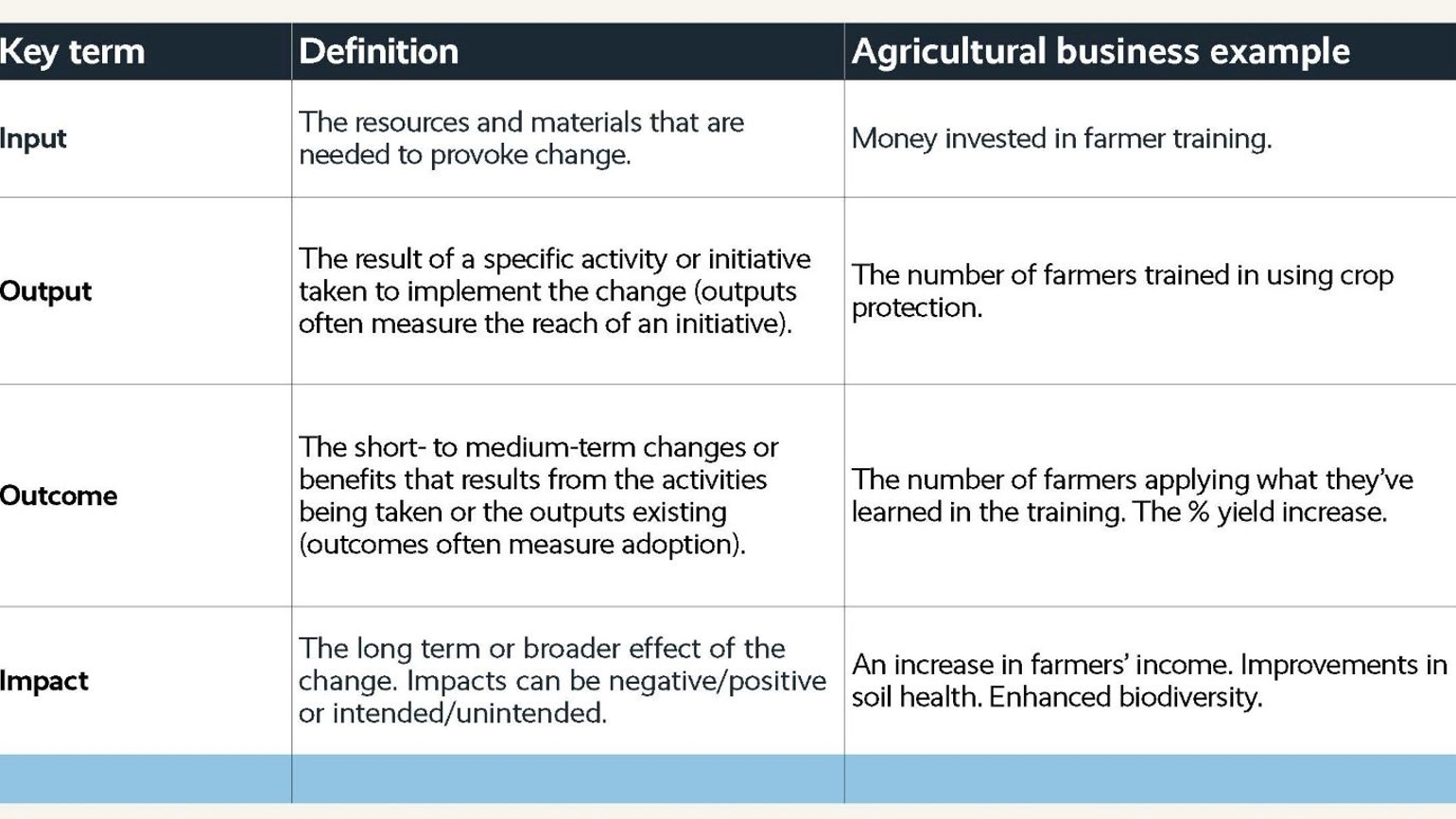Return to journal
It's time to stop misusing the word 'impact'
Sustainability strategist Isabel Shipley explains why its crucial to understand and measure impact correctly.

Lately, I’ve been seeing a lot more sustainability reports titled ‘impact reports’. And it’s worrying me. For the simple reason that these sustainability reports aren’t impact reports, and calling them such is proliferating the confusion between outputs and impacts.
Organisations should absolutely be measuring and communicating impacts, but there’s some learning to do to get there (more on that later). And in the meantime, it would be in everyone’s interest if we cleared up this tangled terminology, explained the danger in ignoring impact and clarified the benefits of using the term ‘impact’ properly.
What does ‘impact’ really mean?
Let’s start with the basics. A few definitions in their simplest forms (and a worked example to illustrate):

As you can see, outputs and impacts aren’t the same thing. Within their sustainability reports, most organisations measure and communicate performance outputs, which is very different to measuring and communicating organisational impact.
Whether it’s an unintentional confusion over the difference between outputs and impacts resulting in the mislabelling of a report, or a deliberate choice to focus reporting content on outputs instead of impacts, I’d suggest there can be damaging consequences to both.
The dangers of mislabelling or ignoring impact
Firstly, mislabelling your efforts as impacts draws the focus away from the real (and often difficult) work that needs to be done and distracts the audience with seemingly impressive figures and statistics that don’t actually say anything about the long-term change that organisation is trying to drive (i.e. the impact).
Secondly, choosing to focus sustainability reporting on outputs (rather than impacts) means organisations are only talking about improvements in areas they can control – which isn’t the full picture. Impacts generally reside in organisations’ spheres of indirect influence, meaning whilst they can take action to influence the result they want to see, the success is reliant on other influences that are broader, deeper and slower than those an organisation has direct influence over. In an age of increasing expectation for corporate transparency, accurately communicating impact is more important than ever to give stakeholders that full picture.
Thirdly, actively choosing not to focus on impact threatens to undermine sustainability itself. Sustainability professionals and many within the business community know that prioritising sustainability can lead to attractive social, environmental and financial returns. However, the lack of focus on the impact of sustainability related initiatives, and demonstrating those returns, poses a significant barrier and risks undermining sustainability. Ultimately, impact is hugely important to move away from incremental change, towards genuine progress.
Why we need impact measurement
Accurately measuring impact is also crucial for organisations’ own learnings and future success: it will help them understand the unintended consequences of their activities (both positive and negative) and identify opportunities to improve. Organisations must then be honest and transparent in communicating this impact externally to demonstrate meaningful progress (or lack of) against their sustainability ambitions.
However, we must acknowledge that impact measurement is hard, particularly for the social aspects of sustainability which are often less quantifiable and less easy to measure. The difficulty with impact measurement is why so few organisations really do it properly. It will take a while to get it perfect, and we’ll inevitably enter a transition stage as organisations start giving it a go.
Not least because impact is a key part of the EU’s impending CSRD regulation. It requires executives to understand and manage any significant impacts that their company has on the environment and society (in addition to the traditional outside-in view of how sustainability topics could affect the company’s finances).
Context is also key to communicating impact
It’s not just CSRD that is changing the way we think about, measure and use the term ‘impact’. The UN’s Sustainable Development Performance Indicators (SDPIs) are a potential game-changer for how we use the term ‘impact’ within sustainability.
The SDPIs (released in November 2022) are a set of indicators aimed at getting businesses to measure and report data with greater context. Integral to the SDPIs is ‘context-based sustainability’ which is a performance accounting system that measures and reports the impacts of organisations against norms, standards or thresholds at levels deemed ‘sustainable’.
Context-based sustainability metrics will enable businesses to drive and measure performance in the context of these thresholds i.e. upper ecological ceilings and lower social foundations. In other words, rather than just assuming that data indicating a positive trend (e.g. reduction in water use) equals great performance, we’ll be able to tell whether a company’s reported progress actually falls within safe social and environmental thresholds. And crucially, this will enable companies to provide a more accurate picture of their impact on society and the environment.
Allen White, Co-Founder of the GRI has remarked on the launch of the SDPIs: ‘sustainability requires contextualisation within thresholds. Sustainability measurement without context is simply not sustainability measurement.’
Impact can help us focus on the transformational change needed
So, it’s vital we clarify and get to grips with the term ‘impact’. We must move away from measuring performance, towards measuring impact in the context of environmental and social parameters.
When understood and measured correctly, ‘impact’ has the potential to significantly move the needle in terms of how we think about sustainability progress.
It will help us to focus on the broader, longer-term, transformational change that is needed for true sustainable development. And it will equip us to hold organisations accountable.
This requires a change in both mindset and practice, it won’t necessarily be linear and organisations can’t be expected to improve instantly. But it is something organisations would be wise to embrace. Because mentioning ‘impact’ without truly doing it is risky business – it risks your reputation, it risks your ability to drive meaningful change and it risks undermining sustainability as a whole.
There are a number of resources available for organisations looking for guidance for managing impact: The Impact Management Platform and The Global Impact Investing Network (GIIN) are a great place to start.
